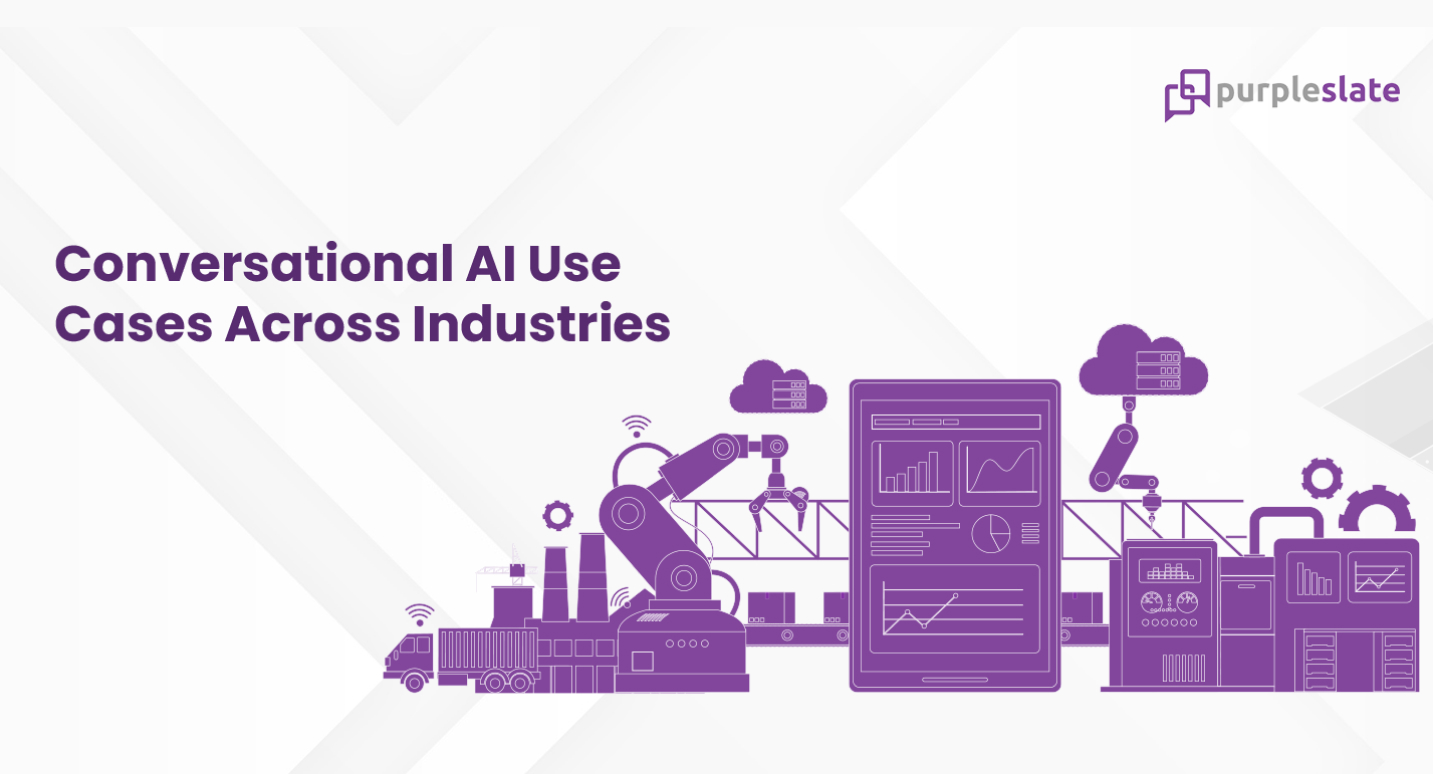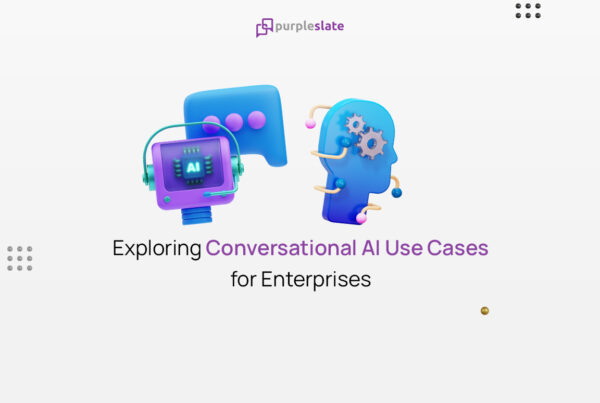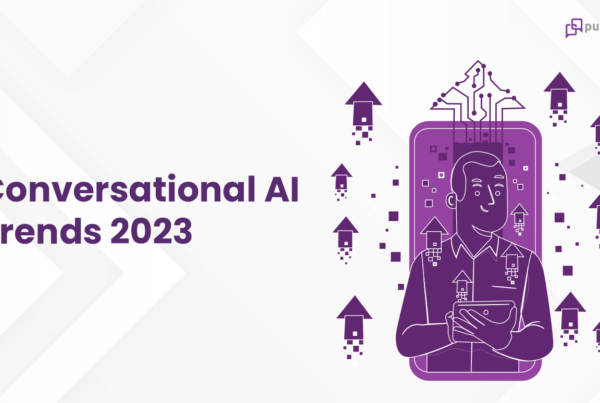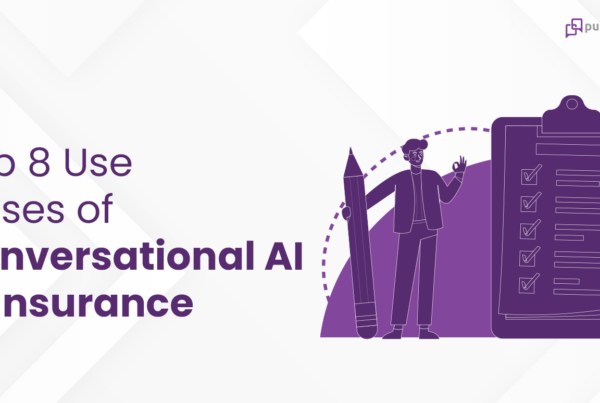
Introduction
Conversational AI has seeped into almost every industry today and it is changing how businesses and individuals interact and perform everyday tasks. Customers and businesses alike have joined this AI revolution over the last few years. For customers, conversational AI means quicker responses, better customer service, easier order fulfillment, and a more personal connection with the brands they do business with while for businesses it means cheaper customer support costs, higher conversion rates, boosted customer loyalty, accelerated sales cycles, and increased lead generation.
Here are the top industries that have adopted conversational AI, how it is being used across sectors and how they can be customized to suit business needs:
Conversational AI for Insurance
According to research, 87% of insurance brands invested over $5 million in AI-related technologies each year. InsurTech has become a powerful driver of change in the insurance sector. There’s a lot of potential for AI technology to transform this industry and automate repetitive and time-consuming tasks. A smart conversational AI assistant can act as a digital agent for an insurer’s customers, be available to them at all times and provide a seamless experience every time they interact with them.
In information-heavy businesses such as insurance, conversational AI has been proven to be advantageous in bridging knowledge gaps and in creating an environment of transparency and clarity around insurance. Insurance providers can steer conversational AI to go directly to the customers and help policyholders to go through the entirely digital insurance purchase journey by themselves.
For example, a buyer looking to buy car insurance can explore the various products available, compare their prices and premiums, find the plan that suits their needs best and proceed to purchase – all by asking questions to the conversational AI assistant. This way, businesses can benefit from enabling self-service for end-user without having to connect to an agent and thereby accelerating the buyer’s journey. It is also important to note that conversational AI has opened up new channels of selling for insurance firms. Customers today can connect with AI virtual assistants through any of their desired channels such as Whatsapp, Facebook, Instagram, and so on through voice or text or even through IVR/telephony and have human-like conversations with AI assistants.
Conversational AI for Healthcare
Being a healthcare professional is difficult as it is. The absolute focus and attention to detail that is medical profession demands take a toll on doctors, nurses, and employees of the medical industry alike. A study shows that one-sixth of an average physician’s working hours are spent on administrative tasks.
In the healthcare industry, conversational AI has the potential to revolutionize the way healthcare professionals interact with patients, streamline administrative processes, and ease patient treatment experiences.
Conversational AI virtual assistants allow patients to ask questions, receive the right information, and schedule appointments through a conversational interface, such as a chat window or voice assistant. AI assistants also allow patients to easily access information and resources without having to navigate complex websites or wait on hold for a customer service representative. This can be especially useful for patients who have mobility issues or live in remote areas, as they can easily access healthcare information from the comfort of their own homes.
In addition to this, conversational AI can also be used to streamline administrative processes in healthcare by integrating information sources and creating a single system of records. They can also be used to automatically schedule appointments, refill prescriptions, or process insurance claims. This can help to reduce the workload for healthcare professionals, freeing them up to focus on more complex tasks and improving the overall efficiency of the system.
Conversational AI for E-Commerce
The global eCommerce market is growing rapidly. The total value of retail eCommerce sales in 2017 alone was $2.3 trillion. And by 2025, it is expected to have doubled to $7.39 trillion. Due to this exponential growth, traditional customer service and sales mechanisms including phone calls, emails, and social media have collapsed simply because there aren’t enough support representatives to cater to customer needs.
With conversational AI, e-commerce businesses can answer up to 80% of customer queries and provide detailed product descriptions about features and specifications, helping customers to make informed purchasing decisions all through real-time conversations.
Brands that offer personalized shopping experiences can win customer loyalty and encourage shoppers to come back to them. One of the primary use cases of conversational AI for e-commerce is exactly that. Virtual assistants can be used to provide personalized product recommendations based on a customer’s previous purchases or browsing history, helping to increase sales and customer satisfaction. In addition to this, conversational AI can also be used for upselling and cross-selling strategies by suggesting products that are similar or complementary to existing products bought by the customers.
Virtual AI assistants can guide customers through the checkout process, helping to reduce abandoned cart rates and increase conversion rates. They can also be leveraged to automatically process orders and provide updates on delivery status, reducing the need for manual input and freeing up time for employees for other tasks. Here’s an interesting read on eCommerce powered by conversational AI also known as conversational commerce.
Conversational AI for Manufacturing
Conversational AI is a great tool to use in manufacturing because it can automate manual tasks and help improve productivity. Worker safety is one of the indispensable divisions that often requires the most attention in a manufacturing setting that involves heavy machinery. One of the key benefits of conversational assistants in manufacturing is that they can improve safety on the job. In a manufacturing setting, workers often have to multitask and juggle multiple responsibilities, which can lead to distractions and accidents. With a voice-enabled AI assistant that can transcript, workers can keep their hands and eyes free while documenting crucial data and save time, and also significantly reduce the risk of accidents.
Conversational AI for manufacturing can come in handy during several other tasks such as inventory management, machinery maintenance, training and so much more. For example, through conversational AI, companies will be able to track their inventory levels more efficiently and keep themselves from running out of stock before its time. Similarly, when it comes to maintenance, an AI assistant can be integrated with machinery to monitor their performance and alert maintenance staff to potential issues before they become serious problems. This can help to reduce downtime and improve the overall efficiency of the manufacturing process.
Conclusion
Conversational AI is an exciting technology that has several use cases for many different industries. Conversational AI is already being used by insurance companies to help customers understand their coverage options and reduce fraud risk. Similarly, it has the potential to improve customer experience, increase efficiency, and open doors to new opportunities across industries. To learn how companies of various industries are using conversational AI and to create an AI assistant that is tailored to your unique business needs, get in touch with purpleSlate today.




